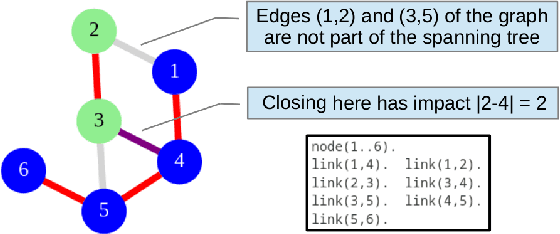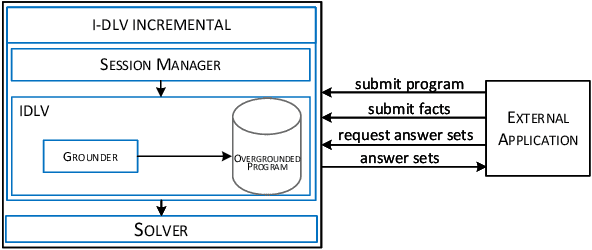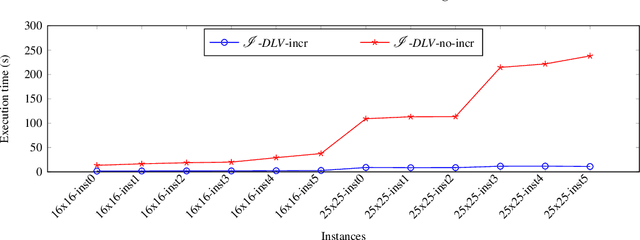Francesco Pacenza
University of Calabria - Department of Mathematics and Computer Science
ASP-based Multi-shot Reasoning via DLV2 with Incremental Grounding
Dec 24, 2024Abstract:DLV2 is an AI tool for Knowledge Representation and Reasoning which supports Answer Set Programming (ASP) - a logic-based declarative formalism, successfully used in both academic and industrial applications. Given a logic program modelling a computational problem, an execution of DLV2 produces the so-called answer sets that correspond one-to-one to the solutions to the problem at hand. The computational process of DLV2 relies on the typical Ground & Solve approach where the grounding step transforms the input program into a new, equivalent ground program, and the subsequent solving step applies propositional algorithms to search for the answer sets. Recently, emerging applications in contexts such as stream reasoning and event processing created a demand for multi-shot reasoning: here, the system is expected to be reactive while repeatedly executed over rapidly changing data. In this work, we present a new incremental reasoner obtained from the evolution of DLV2 towards iterated reasoning. Rather than restarting the computation from scratch, the system remains alive across repeated shots, and it incrementally handles the internal grounding process. At each shot, the system reuses previous computations for building and maintaining a large, more general ground program, from which a smaller yet equivalent portion is determined and used for computing answer sets. Notably, the incremental process is performed in a completely transparent fashion for the user. We describe the system, its usage, its applicability and performance in some practically relevant domains. Under consideration in Theory and Practice of Logic Programming (TPLP).
Extending Answer Set Programming with Rational Numbers
Dec 07, 2023
Abstract:Answer Set Programming (ASP) is a widely used declarative programming paradigm that has shown great potential in solving complex computational problems. However, the inability to natively support non-integer arithmetic has been highlighted as a major drawback in real-world applications. This feature is crucial to accurately model and manage real-world data and information as emerged in various contexts, such as the smooth movement of video game characters, the 3D movement of mechanical arms, and data streamed by sensors. Nevertheless, extending ASP in this direction, without affecting its declarative nature and its well-defined semantics, poses non-trivial challenges; thus, no ASP system is able to reason natively with non-integer domains. Indeed, the widespread floating-point arithmetic is not applicable to the ASP case, as the reproducibility of results cannot be guaranteed and the semantics of an ASP program would not be uniquely and declaratively determined, regardless of the employed machine or solver. To overcome such limitations and in the realm of pure ASP, this paper proposes an extension of ASP in which non-integers are approximated to rational numbers, fully granting reproducibility and declarativity. We provide a well-defined semantics for the ASP-Core-2 standard extended with rational numbers and an implementation thereof. We hope this work could serve as a stepping stone towards a more expressive and versatile ASP language that can handle a broader range of real-world problems.
Rethinking Answer Set Programming Templates
Jul 12, 2023


Abstract:In imperative programming, the Domain-Driven Design methodology helps in coping with the complexity of software development by materializing in code the invariants of a domain of interest. Code is cleaner and more secure because any implicit assumption is removed in favor of invariants, thus enabling a fail fast mindset and the immediate reporting of unexpected conditions. This article introduces a notion of template for Answer Set Programming that, in addition to the don't repeat yourself principle, enforces locality of some predicates by means of a simple naming convention. Local predicates are mapped to the usual global namespace adopted by mainstream engines, using universally unique identifiers to avoid name clashes. This way, local predicates can be used to enforce invariants on the expected outcome of a template in a possibly empty context of application, independently by other rules that can be added to such a context. Template applications transpiled this way can be processed by mainstream engines and safely shared with other knowledge designers, even when they have zero knowledge of templates.
Incremental maintenance of overgrounded logic programs with tailored simplifications
Aug 06, 2020Abstract:The repeated execution of reasoning tasks is desirable in many applicative scenarios, such as stream reasoning and event processing. When using answer set programming in such contexts, one can avoid the iterative generation of ground programs thus achieving a significant payoff in terms of computing time. However, this may require some additional amount of memory and/or the manual addition of operational directives in the declarative knowledge base at hand. We introduce a new strategy for generating series of monotonically growing propositional programs. The proposed overgrounded programs with tailoring (OPTs) can be updated and reused in combination with consecutive inputs. With respect to earlier approaches, our tailored simplification technique reduces the size of instantiated programs. A maintained OPT slowly grows in size from an iteration to another while the update cost decreases, especially in later iterations. In this paper we formally introduce tailored embeddings, a family of equivalence-preserving ground programs which are at the theoretical basis of OPTs and we describe their properties. We then illustrate an OPT update algorithm and report about our implementation and its performance. This paper is under consideration in Theory and Practice of Logic Programming (TPLP).
Reasoning in Highly Reactive Environments
Sep 18, 2019Abstract:The aim of my Ph.D. thesis concerns Reasoning in Highly Reactive Environments. As reasoning in highly reactive environments, we identify the setting in which a knowledge-based agent, with given goals, is deployed in an environment subject to repeated, sudden and possibly unknown changes. This is for instance the typical setting in which, e.g., artificial agents for video-games (the so called "bots"), cleaning robots, bomb clearing robots, and so on are deployed. In all these settings one can follow the classical approach in which the operations of the agent are distinguished in "sensing" the environment with proper interface devices, "thinking", and then behaving accordingly using proper actuators. In order to operate in an highly reactive environment, an artificial agent needs to be: 1. Responsive -> The agent must be able to react repeatedly and in a reasonable amount of time; 2. Elastic -> The agent must stay reactive also under varying workload; 3. Resilient -> The agent must stay responsive also in case of internal failure or failure of one of the programmed actions in the environment. Nowadays, thanks to new technologies in the field of Artificial Intelligence, it is already technically possible to create AI agents that are able to operate in reactive environments. Nevertheless, several issues stay unsolved, and are subject of ongoing research.
* In Proceedings ICLP 2019, arXiv:1909.07646
Incremental Answer Set Programming with Overgrounding
Jul 22, 2019



Abstract:Repeated executions of reasoning tasks for varying inputs are necessary in many applicative settings, such as stream reasoning. In this context, we propose an incremental grounding approach for the answer set semantics. We focus on the possibility of generating incrementally larger ground logic programs equivalent to a given non-ground one; so called overgrounded programs can be reused in combination with deliberately many different sets of inputs. Updating overgrounded programs requires a small effort, thus making the instantiation of logic programs considerably faster when grounding is repeated on a series of inputs similar to each other. Notably, the proposed approach works "under the hood", relieving designers of logic programs from controlling technical aspects of grounding engines and answer set systems. In this work we present the theoretical basis of the proposed incremental grounding technique, we illustrate the consequent repeated evaluation strategy and report about our experiments. This paper is under consideration in Theory and Practice of Logic Programming (TPLP).
 Add to Chrome
Add to Chrome Add to Firefox
Add to Firefox Add to Edge
Add to Edge